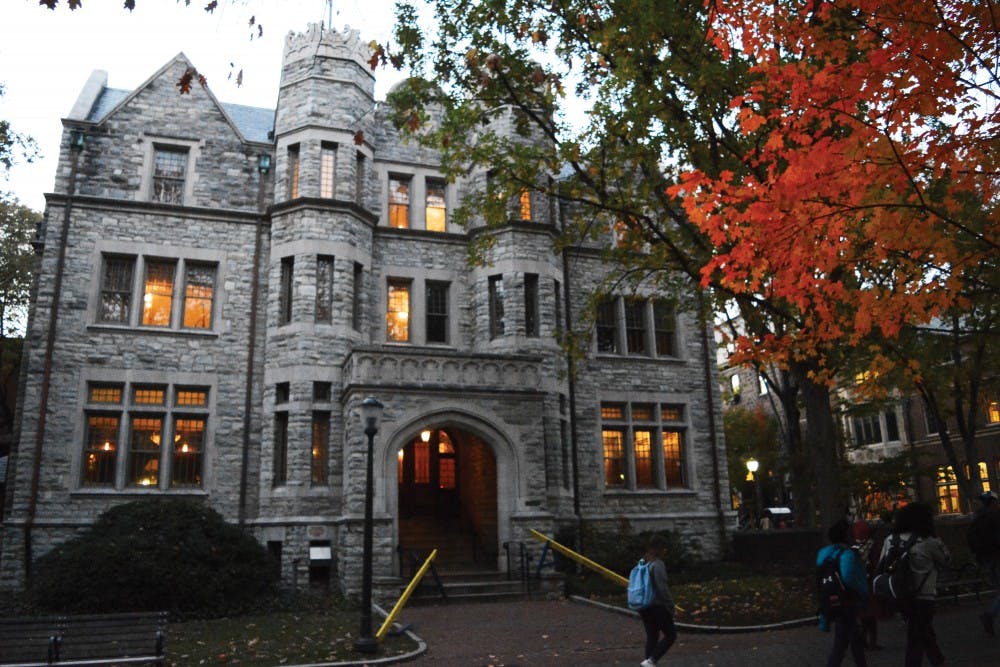During the midnight hour, the clattering of poker chips being wrested around arises from the basement of Harrison College House—this is where the Penn’s Poker Club resides weekly. Around fifteen boys sit amongst stacks of red, green, blue, and white chips, laughter, and what members like to call "poker–ocean lingo." It’s common to hear about fishes—the less adept poker players; whales—the players with large bankrolls; sharks—the skilled players, and boats—a full house of cards. There, you can also find one of the club’s “regulars”: Vignesh Valliyur (C’20)—or as his fellow players like to call him, “Viggy Value.” Viggy coined his poker name through his luck and skilled hand.
“[Viggy] gets value at the table. He makes money. And he takes everyone’s money,” another regular, Zach Drapkin (W’22) explains. Viggy, who made a whopping $1,600 this semester alone, is humble about his earnings. Poker is just a hobby for Viggy, but quite a high-paying one, that is, if a player is focused and determined. Players might make from $450 to $1,000 in one night—unless they lose it first.
“It’s an interesting dynamic because this is a club where people take each other’s money, but for the most part, everyone’s fine with it. No one really holds a grudge. I’ve lost money, he’s taken money from me … It’s a cycle,” Viggy points to Zach and they both laugh. Zach rebuts, claiming that Viggy makes more money than he loses, but Viggy shrugs him off. Sporting a navy blue Penn Poker Club quarter–zip, Viggy obsessively shuffles his chips in the palm of his hand. He’s eager to play the game.
The boys laugh at the club’s unofficial name: Penn’s "Anti–Gambling Gambling Club." The club has been active for about ten years. “We just happen to be people who are serious about poker and want to improve our game. We play for perhaps slightly higher stakes than other groups,” Viggy explains.
Playing poker in a basement can certainly get competitive—however, the attitudes of these players are relaxed and comical. There is a camaraderie in the club which each player attests to. Although poker is an individual sport that demands self–interest, Viggy says that they "root for [their] players to win at a tournament … It’s nice when a Penn player does well.”
Every fall in Houston Hall, hundreds of poker players from clubs across the country come together to play the Susquehanna International Group tournament. Because this investment company was founded by poker players, they sponsor this well–known tournament, offering a $3,000 prize bowl. Notable players from Columbia, Carnegie Mellon, and Yale, among other universities, come to campus for the event.

Psi Upsilon (Castle) house on Locust Walk
Another popular poker event held on campus in the spring takes place at Psi Upsilon Tau (Castle) where the winnings go to "Diviendo Voluntario para la Comunidad,” a subsidiary of the non–profit organization United Way. Gus Owen (C’21 W’21), the philanthropy chair of Castle, says that “the donation will support their nutrition program for incredibly vulnerable children between the ages of 2 to 6 in Venezuela. The program consists of breakfast and a snack that represents 45% of daily nutritional needs and a protein drink that provides a further 30% of those needs.” Diviendo Voluntario para la Comunidad’s goal is for the donations to reach and help 10,000 children throughout Venezuela this year. This year, the event raised $880 for the cause.
For non–organized events, much of the coordinating is done through Facebook, where anyone can post to the Facebook group to arrange a game. In a lot of ways, games are spontaneous and have a different mix of people every time—except for the regulars.
While it appeared to me on this particular night that Robert Zajac (E’19) was a regular at the table, it was actually his first time joining the group for a game. “I’m a second–semester senior … It was time to pick up a hobby,” he tells me. Robert plans on returning to the basement because he enjoys the spirit of the group. The people you play with seem to matter when it comes to poker.
This club is not simply a place where people play against each other—members of the poker club genuinely want to help each other improve their game. Each player brings with them to the table a set of tricks and knowledge from their past experiences, thus making them valuable teachers to others in the group. One of the first times Viggy played with the group, two upperclassmen gave him advice on how to improve his game. “It’s nice that a bunch of the guys here will introduce us to different hands so people can get better at the game. It’s not just about taking people’s money,” he tells me. One of the team’s "biggest outings" was Viggy’s 21st birthday, spent at a casino. “It wouldn’t be fun unless we are all friendly,” Zach adds.
“Want to sweat a hand with me?” Viggy asks. I assure him that I’m a lost cause with zero poker knowledge. He explains that "sweating a hand" with someone signifies when a player reveals their hand to an uninvolved spectator, who then can watch if the round turns in their favor. It’s obvious that Viggy and his friends want outsiders to share their enthusiasm for the game.
There are most certainly other poker groups on campus, whether that might be people who casually go in groups to a casino or people who play on a more low–key, low–risk level in fraternity houses. More exclusive groups seem to reflect the economic status of their players—or rather, how much their players are willing to risk.
“Some people at Penn can definitely afford to risk big amounts of money more than others. I would say I am one of the more nitpicky people here… I’m not as willing to risk that much,” Zach informs me. Viggy adds on: “There’s a lot of money. You decide what stakes you want to play comfortably,” revealing that there isn’t great pressure to play certain pots when there are so many groups with varying entry costs. “There are also people who come to these games who just don’t really care about their money. They just want to play and they have a great time,” Zach says, which ultimately benefits the players who are more skilled and do care about their money because they can win it back.
As an absolute newcomer to poker, I was surprised to learn that girls in poker are a minority. There was not one girl in the room of 12 guys. The club members acknowledge this, joking that they try to recruit their girlfriends to play with them. However, they are unsuccessful in convincing them to join these pick–up games.
“The problem is, you can’t get someone to play poker who doesn’t want to play poker, because there is risk involved. I feel like it’s kind of intimidating for people especially if they don’t know anyone in the club,” a third regular, Sam Davis (E’20), admits. Harry Papaioannou (C’21), another regular, agrees with Sam’s sentiment and adds that anyone is welcome to the club—regardless of skill level or gender.
In Penn’s high–stress environment, sometimes all you need is a night playing a fun game of poker with both old buddies and new faces. “It’s a great relief,” Viggy emphasizes.
“Win or lose, people have fun. It’s a way to escape from the stress of Penn and to develop a skill that could make you money in the future,” says Harry. For Viggy, Zach, Sam, and Harry, poker is a way for them to practice, learn, and master their skills while having a mindlessly fun time with people who share their love for the sport.

